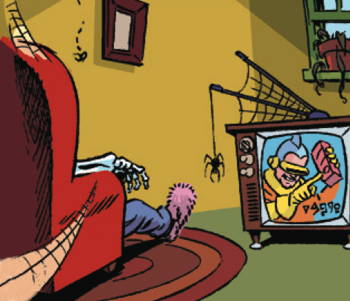November 2018
November 11, 2018
Follies of the Madmen #394
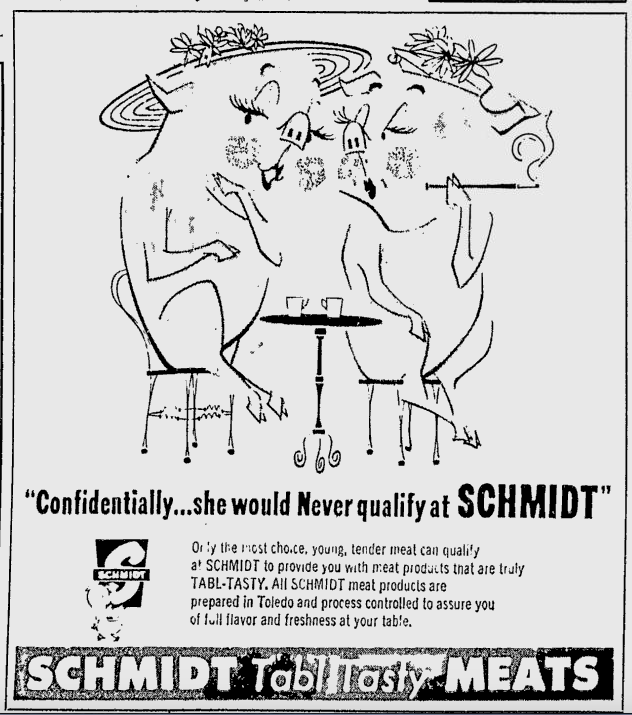
Sexy female pigs discuss sending one of their own kind to the slaughterhouse.
Original ad here.
Posted By: Paul - Sun Nov 11, 2018 -
Comments (3)
Category: Animals, Anthropomorphism, Business, Advertising, Death, Food, 1960s
November 10, 2018
You Know Scholarship
From Sleeping Dogs Don't Lay: Practical Advice For The Grammatically Challenged by Richard Lederer and Richard DowisThe first year’s winner was thirteen-year-old Dalton Hartman, who submitted a tape with forty-one you knows in four minutes, thirty-eight seconds. The next year, a fifth grader named Jason Rich took the prize. His tape, a twelve-minute interview with a basketball coach, had sixty-four you knows...
Colonel Oldfield has made arrangement in his estate for continuation of the contest.
Oldfield died in 2003. I can't find any evidence that the scholarship did continue after his death. This LA Times article has more info about his somewhat eccentric philanthropy.

Des Moines Register - Feb 16, 1997
Posted By: Alex - Sat Nov 10, 2018 -
Comments (3)
Category: Awards, Prizes, Competitions and Contests, Languages
WattStax
This documentary has it all: great music, great interviews, great cinematography, ongoing thematic relevance to today. But we feature it on WU mainly for the clothing, both of performers and of the audience. Viewers might also empathize with the director's fascination with hotpants.
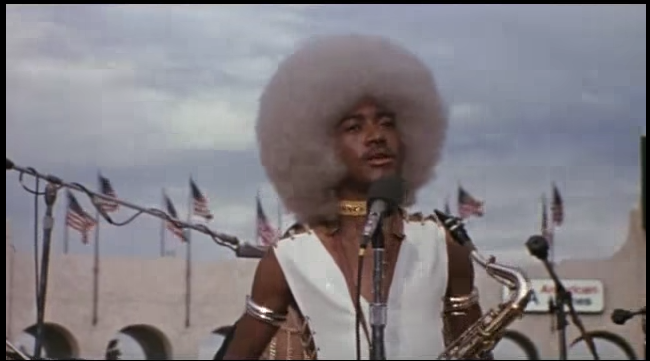
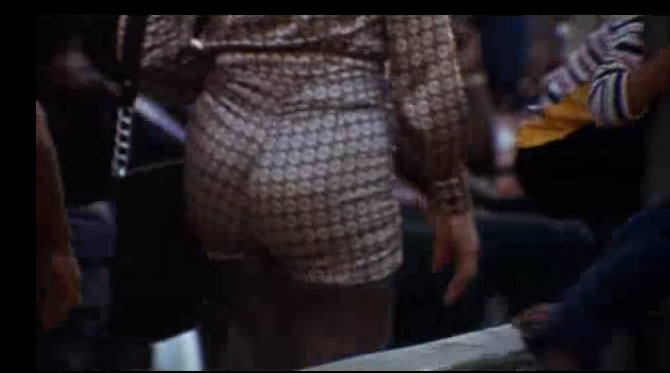
Posted By: Paul - Sat Nov 10, 2018 -
Comments (0)
Category: Drugs, Ethnic Groupings, Fashion, Music, Pop Art, Documentaries, Bohemians, Beatniks, Hippies and Slackers, 1970s
November 9, 2018
Divorce, The Magazine for People Starting Over
Back in 1987, twice-divorced Manhattan lawyer Daniel Hirsch got the idea that divorcees were a potentially untapped audience for a magazine. As he described it:Hirsch managed to get investors to back his idea, but it never made it to a first issue. Apparently it had trouble attracting advertisers. This Washington Post article explains the skepticism about the idea:
But it seems like it can't have been that bad of an idea because some googling reveals that there is in fact a Divorce magazine that's been in existence since 1996, and still seems to be going strong.

Posted By: Alex - Fri Nov 09, 2018 -
Comments (0)
Category: Magazines, Divorce
The Funky Gibbon
More on The Goodies here.
Thanks to WU-vie Richard Bos.
Posted By: Paul - Fri Nov 09, 2018 -
Comments (1)
Category: Humor, Comedians, Music, Reader Recommendation, 1970s
November 8, 2018
How to make pineapple from zucchini
It's "zucchini pineapple." Info from Healthy Canning:You may also see it called “Mock Pineapple” or “Faux Pineapple.”...
Proponents of the recipe touted cost savings versus the real thing, but we’re not sure if that is necessarily true anymore.
Basically you put zucchini in a can with some pineapple juice, lemon juice, and sugar. Seal it up for a while, and it turns into something kind of like pineapple.


Fremont News-Messenger - July 21, 1981
Posted By: Alex - Thu Nov 08, 2018 -
Comments (6)
Category: Food, 1980s
Superman to the Rescue!
Posted By: Paul - Thu Nov 08, 2018 -
Comments (7)
Category: Business, Advertising, Domestic, Food, Comics, 1950s
November 7, 2018
Tunies, the tuna hot dog
The creation of William Lane, who envisioned selling them to Catholics who couldn't eat meat on Fridays. Lane also planned to expand his offerings to include Mar-tunies, a cocktail size hot dog, and Sea-lomi, a salami substitute.It's not clear what became of Tunies. A reporter from Star News speculates that they may have been a victim of the Pope’s decision to rescind meatless Fridays in 1967 (although did the Pope ever weigh in on this issue? Some googling suggests it was actually the U.S. Conference of Catholic Bishops which made this decision, in 1966). Anyway, I can't find any evidence of Tunies being sold after 1962.
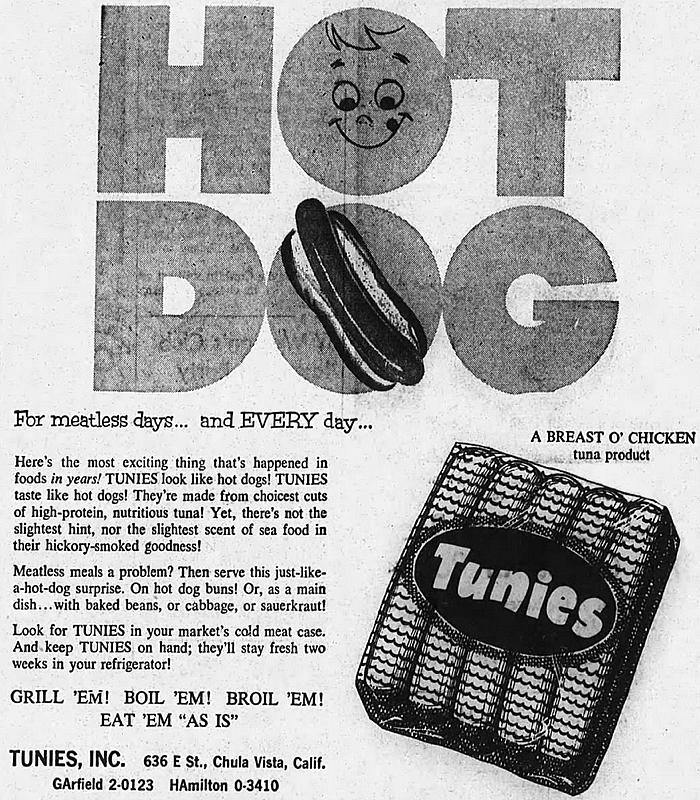
Chula Vista Star-News, California, October 31, 1957 via Yesterday's Print
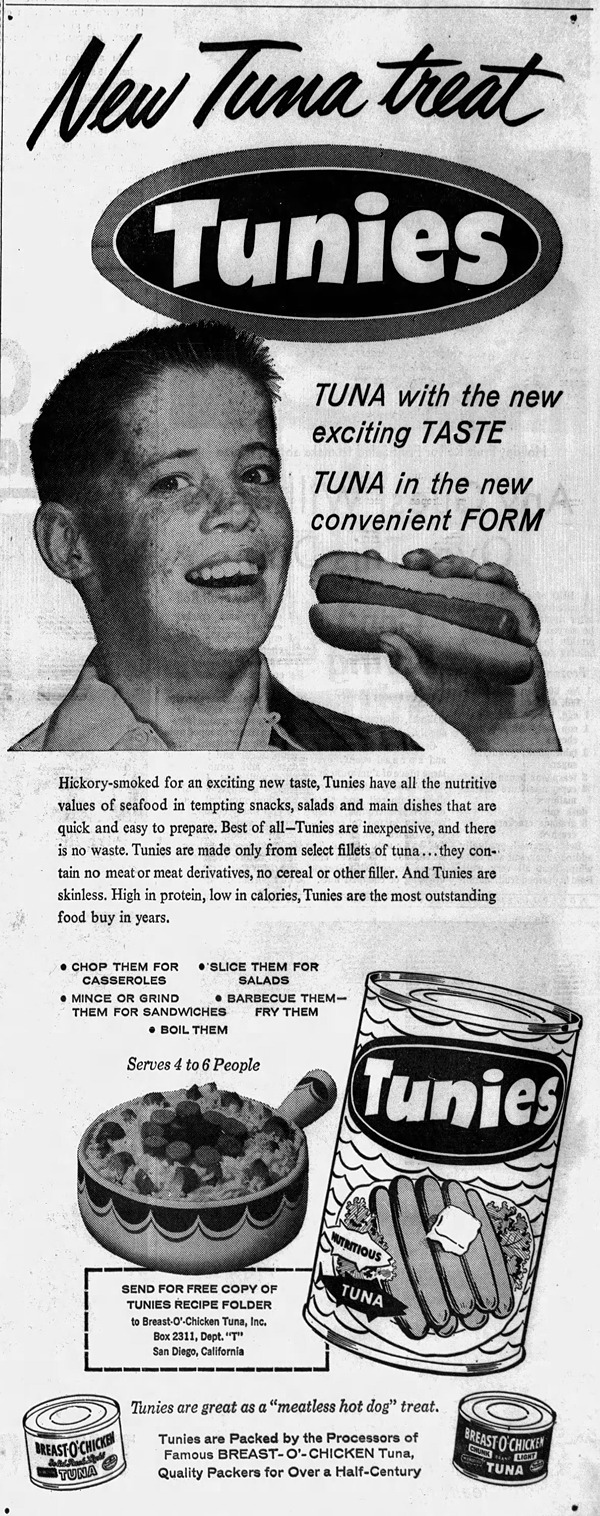
The San Francisco Examiner - Dec 4, 1958
Posted By: Alex - Wed Nov 07, 2018 -
Comments (8)
Category: Food, Religion, 1950s
Accordion Orchestras
Once upon a time, there existed the Hohner Accordion Symphony Orchestra. Amazingly, in this age of mass-digitization, none of their work appears to be on YouTube.But luckily, other similar groups have stepped into the breach.
Posted By: Paul - Wed Nov 07, 2018 -
Comments (3)
Category: Music, Cacophony, Dissonance, White Noise and Other Sonic Assaults
November 6, 2018
Bus Starts
Back in 1985, city officials in St. Louis decided that the term 'bus stop' sounded too negative, so they voted to rename them 'bus starts.' 1800 new 'bus start' signs were duly installed.A year-and-a-half later, when it became clear that people were confused by what a 'bus start' was supposed to be, the city conceded defeat and went back to using the traditional term. This, of course, meant buying even more new signs.
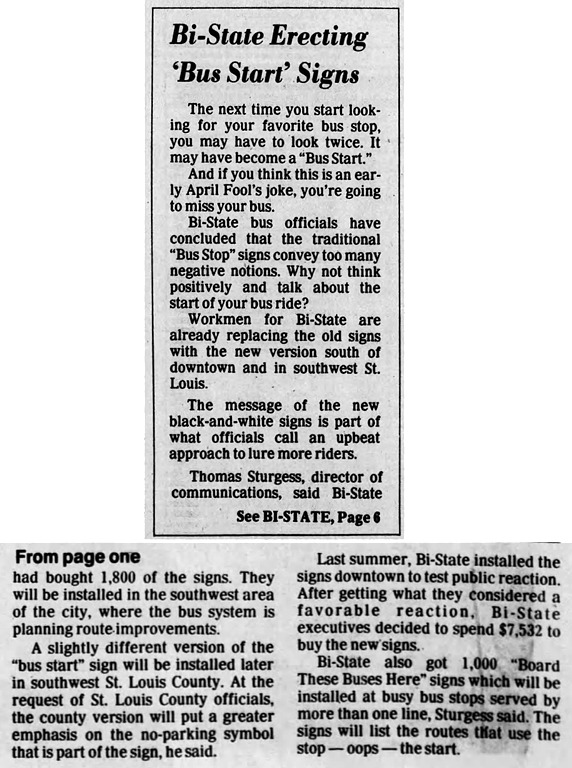
St. Louis Post Dispatch - Mar 28, 1985
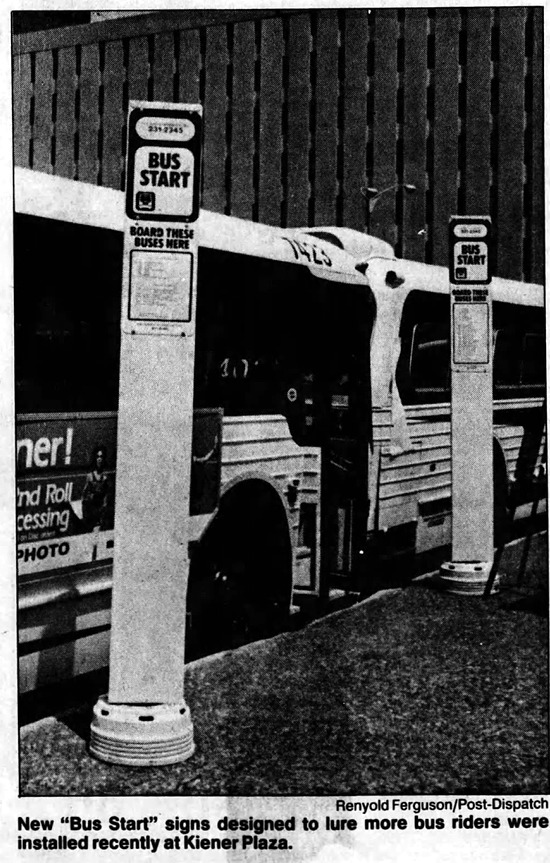
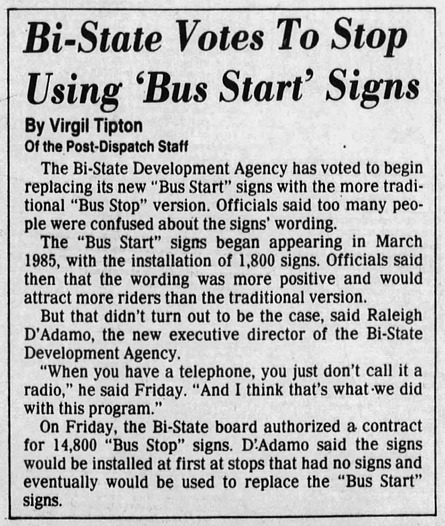
St. Louis Post Dispatch - Aug 24, 1986
Posted By: Alex - Tue Nov 06, 2018 -
Comments (4)
Category: Odd Names, 1980s, Bus
| Get WU Posts by Email | |
|---|---|

| Who We Are |
|---|
| Alex Boese Alex is the creator and curator of the Museum of Hoaxes. He's also the author of various weird, non-fiction books such as Elephants on Acid. Paul Di Filippo Paul has been paid to put weird ideas into fictional form for over thirty years, in his career as a noted science fiction writer. He has recently begun blogging on many curious topics with three fellow writers at The Inferior 4+1. Chuck Shepherd Chuck is the purveyor of News of the Weird, the syndicated column which for decades has set the gold-standard for reporting on oddities and the bizarre. Our banner was drawn by the legendary underground cartoonist Rick Altergott. Contact Us |
